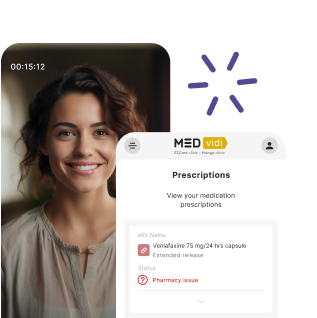Anxiety is one of the most common mental disorders. According to the
Normally, anxiety can occur in response to a threat or when you are facing a challenging situation, such as a job interview or performing in public. In this case, it increases alertness and spurs an action. But if anxiety intensifies, it can affect your day-to-day life. Below, let’s learn more about the symptoms of anxiety attacks and what you can do to overcome them.
Our medical team is here to help

What Does an Anxiety Attack Feel Like?
The acute anxiety attack symptoms can vary from person to person. However, there are also common signs, such as:
- Shortness of breath
- Chest pain
- Dizziness and light-headedness
- Shaking or trembling
- Nausea
- Stomach cramps
- Hot flashes or chills
- Feeling detached from the body
- Fast, pounding, or racing heart (heart palpitations)
- A feeling of losing control
- The overwhelming fear of dying or going insane
It may take several minutes for an intense anxiety attack to peak, and then it subsides gradually or abruptly. Also, anxiety attacks lead to anxiety about future episodes, making a person avoid settings where they have occurred.
The Difference Between Panic Attacks and Anxiety Attacks
A panic attack is similar to an anxiety attack in physical and emotional symptoms, but they differ in causes and intensity.
In the majority of cases, severe anxiety attacks happen due to a stressor or a perceived warning. One can experience it at the mere thought of going to a party, having a first date, attending a job interview, etc. The symptoms of anxiety usually grow gradually because of repetitive thoughts about the upcoming event or the consequences. They may last for quite a while, becoming more intense and finally transforming into an attack.
On the other hand, a
Whether you have panic attacks or extreme anxiety attacks, they can decrease the quality of life. Mental health professionals can help you understand the root causes of these symptoms, choose appropriate treatments, and tell you about evidence-based self-help methods.
Causes
There is no one distinctive cause of anxiety attacks. They can be triggered by several factors, and not necessarily the same factor every time for the same person.
An anxiety attack caused by stress is a common occurrence, but it’s important to know what could lead to such overwhelming stress. The reasons include:
- Loss and grief
- Chronic health condition
- Financial problems
- Family and relationship issues
- Parenthood challenges
- Pressure at work or school
- Changes in living situations, such as moving
Risk Factors
The following are some common risk factors linked to anxiety attacks:
- Genetics. Evidence supports the hypothesis that anxiety disorders are influenced by
heredity[3] . You might be more vulnerable if anxiety or panic disorder runs in your family. - Attributes of Personality. It’s more likely for people with certain personality traits to get anxiety attacks. These traits include perfectionism, high degrees of neuroticism, or an excessive tendency to worry.
- Health Issues. These include several
medical diseases[4] , such as respiratory, cardiovascular, and thyroid issues as well as long-term conditions like chronic pain. - Drug Misuse. Caffeine, nicotine, alcohol, and recreational drugs are examples of substances that might cause or worsen anxiety symptoms.
- The Chemistry of the Brain. It is thought that imbalances of neurotransmitters serotonin and dopamine contribute to anxiety disorders. People who have altered brain chemistry may be more prone to severe anxiety attacks.
- Environmental Elements. These include living in a chaotic or unsafe environment, having high-stress work, having financial issues, or having a dysfunctional family.
- Traumatic Events During Childhood. Adverse
childhood experiences[5] , such as physical, emotional, or sexual abuse, neglect, or being around violence, can raise an individual’s chance of developing an anxiety disorder in the future.
How to Stop an Anxiety Attack?
When you have extreme symptoms, you can take an anti-anxiety medication (if you are prescribed one) or practice deep breathing, muscle relaxation, and mindfulness techniques. However, there are many coping methods for long-term consistent use that allow you to reduce the number of anxiety attacks or make them milder.
Exercise
Exercise is one of the most effective routines for reducing stress, improving mood, and being healthy. Most medical health professionals advise patients to start with something as simple as a 30-minute walk and gradually increase the activity.
Cut Down on Caffeine and Smoking
Nicotine and caffeine are known to give a surge of energy. As much as this energy motivates one to stay active, it can worsen the condition, so patients with anxiety disorders are usually advised to cut down on coffee and energy drinks.
Employ Relaxation Techniques
The most commonly recommended options are visualization,
Prioritize Healthy Eating
A healthy diet includes proteins, vegetables, fruits, fiber, and the appropriate amount of water. It provides all the nutrition necessary for proper body and mind functioning and allows one to feel refreshed.
Get Enough Sleep
Sleep disturbances contribute to the development of mental health conditions such as depression and anxiety. Insomnia and other sleep issues lead to exhaustion, potentially causing the start of anxiety attacks. An average of six to eight hours of sleep makes one feel well-rested and re-energized to face another day.
Keep a Journal
Journaling about your life journey, challenges, and good times can help relieve stress. When, during a major anxiety attack, you feel like your life is turning upside down, reading about past happy experiences or the times when you overcame struggles can be helpful. A journal also helps to keep track of triggers and successful coping methods.
Educate Yourself About Anxiety
Psychoeducation is a crucial part of addressing anxiety disorders. Consult with your healthcare provider to learn more about the specifics of the condition and various ways to overcome it. Sometimes, attending group therapy for people with anxiety is beneficial as it helps to share experiences and valuable tips.
Treatment Options for Frequent Anxiety Attacks
Usually, therapy, medication, and lifestyle modifications are used in combination for the treatment.
Psychotherapy
Talk therapy, also known as psychotherapy, is usually an initial treatment option for
Medications
Medications can help lessen the anxiety in different ways, depending on their mechanism of action. The most commonly prescribed options are the following:
- Selective serotonin reuptake inhibitors (SSRIs) are safe and rarely cause major negative effects. Sertraline (Zoloft), paroxetine (Paxil, Pexeva), and fluoxetine (Prozac) are a few examples.
- Serotonin and norepinephrine reuptake inhibitors (SNRIs), these medications belong to a different class of antidepressants. One such example is venlafaxine (Effexor XR).
- Benzodiazepines. These are sedatives that depress the central nervous system. Alprazolam (Xanax) and clonazepam (Klonopin) are two examples of benzos.
In Conclusion: When to Seek Help?
Self-help tips and routines are good support for your mental health, but sometimes, they are not enough. If you feel that anxiety attacks become frequent or severe, consider seeing a doctor to get your symptoms assessed and receive adequate treatment through medications or psychotherapy. To get help from the comfort of your home, contact MEDvidi today.
Frequently Asked Questions
How do you calm someone having an anxiety attack?
The first step is to create a peaceful atmosphere. Reassure them that they are secure, encourage slow, deep breathing, and assist them in maintaining present-moment awareness. Remember to seek medical help if the person’s symptoms are severe and/or prolonged.
How do I know if I had an anxiety attack?
You may have had an anxiety attack if you suddenly had overwhelming and distressing sensations of panic or terror, in addition to physical symptoms like sweating, dizziness, shaking, rapid heartbeat, and shortness of breath.
What does a severe anxiety attack look like?
Severe anxiety attacks can cause physical symptoms such as chest pain, breathing difficulties, lightheadedness, faintness, and depersonalization.
When should you go to the ER?
If anxiety is severe, or if there is a concern about a possible medical emergency such as a heart attack, it is important to seek immediate medical attention. Additionally, if the person is unable to control the symptoms even after trying coping mechanisms, they should consider visiting the ER.
What are the symptoms of a mini anxiety attack?
A minor anxiety attack can cause abrupt, intense sensations of panic or terror, dizziness, sweating, shaking, shortness of breath, chest pain, or discomfort. It can also cause rapid heartbeat. These symptoms can be upsetting, but they normally pass quickly and disappear.













